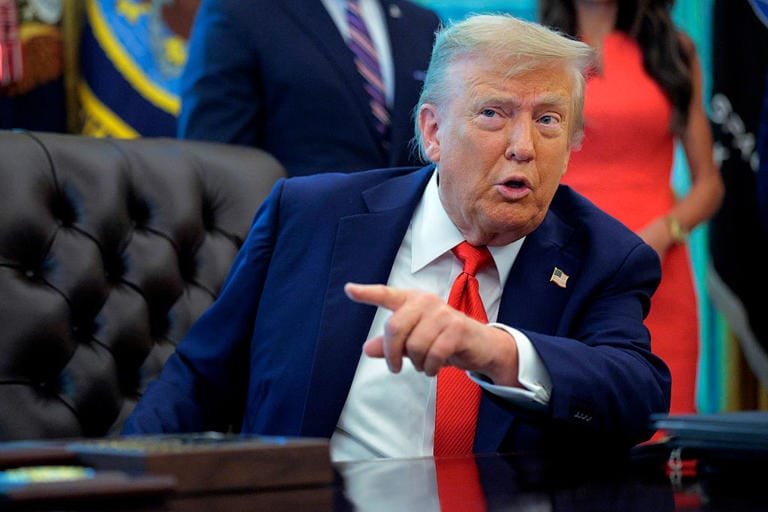Trump’s Push to Revoke ABC and NBC Licenses: A Legal and Media Freedom Analysis 📡
What’s Happening? 📰
In a series of posts on Truth Social, former President Donald Trump accused ABC and NBC of delivering “97% BAD STORIES” about him, labeling them as extensions of the Democratic Party. He expressed support for revoking their FCC licenses or imposing hefty fees for using public airwaves. This rhetoric reignites Trump’s ongoing feud with major broadcasters, intensified by recent legal settlements with CBS and ABC, FCC actions, and a charged political climate. These developments have sparked debates about media freedom and regulatory overreach in the U.S.
Can the FCC Revoke ABC and NBC Licenses? ⚖️
The FCC licenses individual broadcast stations, not national networks like ABC or NBC. Some stations are owned by network parent companies, and licenses are renewed every eight years based on the “public interest, convenience, and necessity” standard. Former FCC Chair Ajit Pai emphasized that the agency cannot revoke a station’s license over the content of news broadcasts, citing First Amendment protections. License revocations are rare and typically tied to severe violations like fraud or undisclosed sponsored content, not editorial bias or unfavorable reporting.
Why This Matters for U.S. Media Freedom 🗽
Trump’s statements place the FCC in a political spotlight, potentially chilling newsroom decisions despite the low likelihood of actual license revocations under current law. Recent FCC scrutiny of broadcasters, alongside settlements like CBS’s $16 million deal and commitments during the Paramount–Skydance merger, has raised concerns among press freedom advocates. These developments suggest indirect pressure on editorial content, even as the FCC maintains it cannot regulate newsroom bias.
Case Study: WLBT and the High Bar for Content Oversight 📺
Historically, the FCC’s ability to punish news content has been limited. The Fairness Doctrine, which required balanced reporting, was eliminated decades ago. A rare case, WLBT in Jackson, Mississippi, saw its license revoked due to systemic racial discrimination and refusal to air civil rights content—far beyond disputes over political coverage. This precedent shows that revocations occur only for egregious, persistent violations, not for critical reporting on politicians.
Legal and Regulatory Reality Check 🔍
While Trump-aligned FCC leadership has initiated investigations and imposed conditions on deals involving Disney/ABC and Comcast/NBC, the agency acknowledges its limited authority over newsrooms. Attempts to use mergers or affiliate relationships as pressure points have drawn congressional scrutiny, highlighting risks to media independence even without direct license revocations.
FCC Licensing Structure at a Glance 📊
| Aspect | What the Law/Practice Says |
|---|---|
| Who gets licensed | Individual local broadcast stations, including some owned by network parents; not national networks like ABC/NBC. |
| License term | Typically renewed every eight years under the “public interest, convenience, and necessity” standard. |
| Revocation grounds | Serious rule breaches like misrepresentations or failure to identify sponsored content; not “biased” news coverage. |
| Content limits | FCC lacks authority to revoke licenses based on news content and does not adjudicate “fake news” claims. |
| Current pressure vectors | Investigations, merger reviews, and voluntary commitments raise concerns over indirect editorial pressure. |
What to Watch Next 👀
Anticipate continued rhetorical attacks and possible petition campaigns targeting individual stations. However, any attempt to revoke a station’s license over unfavorable coverage would face significant legal hurdles, including constitutional protections. Media transactions and affiliate relationships will likely remain focal points for regulatory pressure, keeping debates about FCC actions and media freedom in the headlines.
Frequently Asked Questions ❓
Can the FCC revoke ABC and NBC licenses over negative coverage?
No. The FCC licenses individual stations, not networks, and lacks authority to revoke licenses based on news content or bias claims, per First Amendment protections.
What does “revoke broadcast licenses” mean under FCC rules?
It refers to canceling a station’s authorization, a rare action tied to serious rule violations like fraud, not editorial decisions or critical reporting.
How does this fit into Trump’s tensions with U.S. media?
Trump’s calls to revoke licenses or impose fees continue his pattern of pressuring media through public statements and litigation, raising concerns about government influence.
What’s the latest context for ABC and NBC license news?
Trump’s renewed demands coincide with legal settlements and merger reviews involving CBS, ABC, Disney, Comcast, and Skydance, fueling scrutiny over editorial pressure.
What does this mean for U.S. media freedom?
While direct license revocations are unlikely, escalating rhetoric and regulatory actions raise broader risks to editorial independence.
🌐 Explore More on Global Market Today
Dive deeper into the latest updates, insights, and expert analysis across our most popular categories.
Stay informed on business, economy, AI, and more – all in one place.
📈 Market
💼 Business
🏛️ Politics
🤖 Artificial Intelligence
🔧 Technology
₿ Cryptocurrency
🌍 Economy
💰 Personal Finance
⚡ Fintech Tools
Hindi Version
